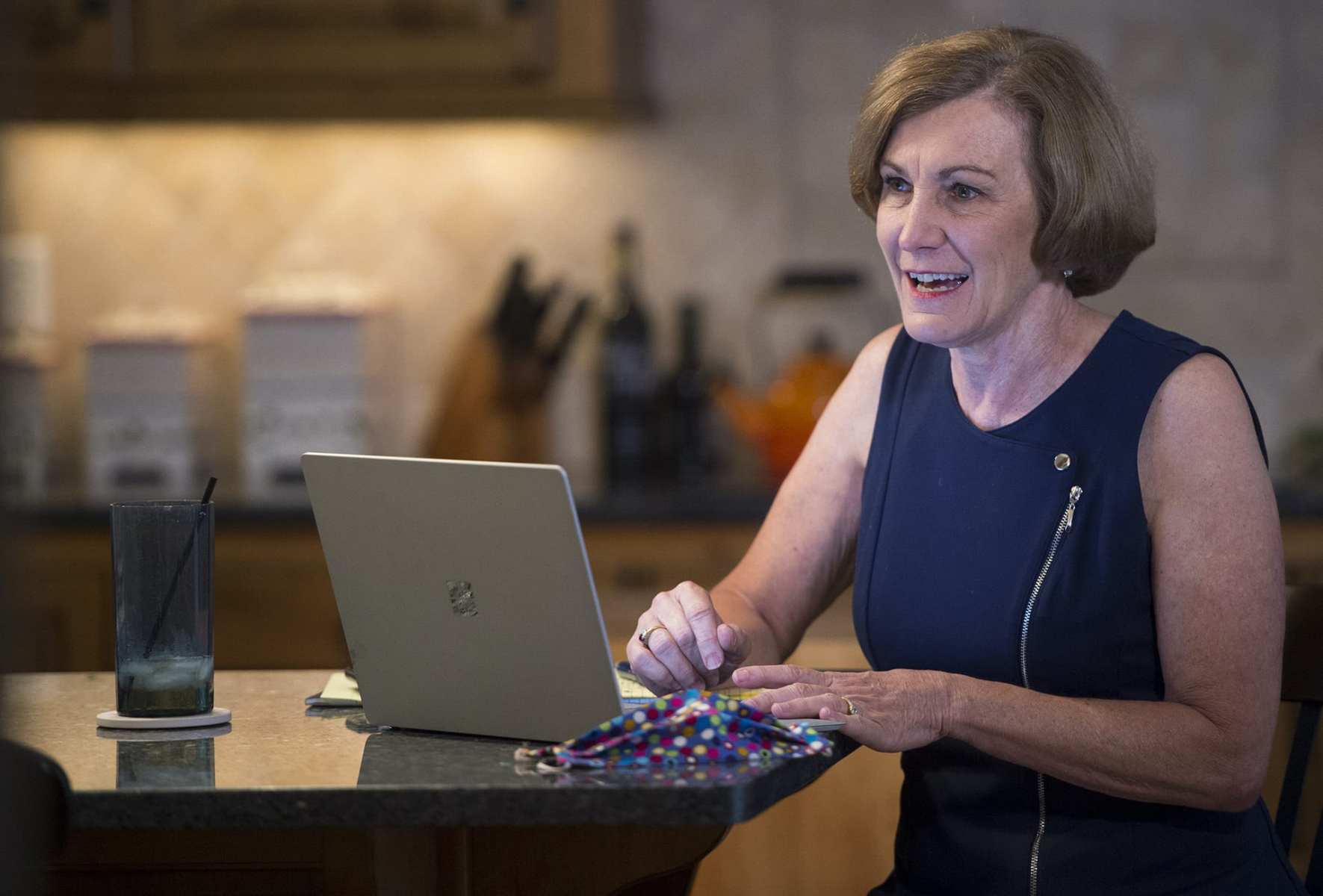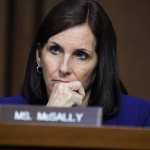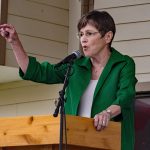Just two years ago, Dr. Barbara Bollier was a Republican in the Kansas state Senate feeling increasingly like a woman without a party.
Now, the anesthesiologist-turned-lawmaker is the Democratic Party’s best hope to win its first U.S. Senate seat in Kansas in nearly 90 years.
In July 2018, Bollier was a moderate Republican representing a district in the Kansas City suburbs, and she kept finding herself at odds with party leaders who she believed were taking things in a direction her constituents didn’t want. With the midterm elections approaching, Bollier said that she thought Tom Niermann, who was competing in the Democratic primary to challenge Republican Rep. Kevin Yoder in a U.S. House district that contained Bollier’s own, was a great “uniter of different ideas.” Kansas Senate President Susan Wagle slammed her support of Niermann as “embarrassing” and “unacceptable.” Bollier was quickly stripped of her committee assignments, a fact she learned as the news spread across Twitter.
Bollier’s fellow Republicans began openly strategizing about how to remove the state senator, who had two years left in her first term after serving seven years in the state’s lower chamber. In that year’s general election, Bollier also backed fellow state Sen. Laura Kelly, a Democrat, in her successful 2018 gubernatorial campaign.
In December of that year, Bollier made it official: She preempted Republican plans to get rid of her by switching parties and joining the Democrats. She said the final straw was the Kansas Republican Party’s adoption of a policy platform hostile to LGBTQ+ rights that states “God created two genders” and that the “privileges of marriage exist only between one man and one woman.”
“I’m like, OK, how much can I take?” Bollier said in an interview with The 19th.
“It has been a challenge, for years, particularly as a Republican, to not be wanted in your own party for standing up for things like equality,” Bollier added. “So I changed parties. And here I am running for U.S. Senate.”
Now, Bollier, 62, is vying to be the first Democrat elected to represent Kansas in the Senate since 1932. The race is also a barometer of whether the Republican Party’s lurch rightward is creating openings for moderate Democrats in solidly red states like Kansas, where President Donald Trump won by more than 20 points in 2016 and is expected to win again in 2020. Democrats need to pick up three or four Senate seats to win control of the chamber.
Every indicator shows that Bollier has a decent chance. A diverse coalition of Kansas Democrats, a sizable number of unaffiliated voters and disaffected Republicans sent Kelly to the governor’s mansion just two years ago. Then, Sen. Pat Roberts, a Republican first elected in 1996 after more than 15 years in the U.S. House, decided to retire, creating an open seat and therefore a more competitive race.
Bollier is neck-in-neck in recent opinion polls with Republican opponent Rep. Roger Marshall, who has represented a large rural U.S. House district in the northwest corner of the state since 2016. Their race, like many Senate contests this year, has shattered previous fundraising records, with Bollier raising roughly $13.4 million in the third quarter and Marshall about $2.7 million.
In a move some interpreted as national Republicans fearing that they could lose what was previously considered a safe seat, Senate Majority Leader Mitch McConnell’s super PAC has spent more than $12 million opposing Bollier or supporting Marshall, including $7.2 million in October. An arm of the Democratic super PAC supporting Senate candidates said earlier this month it would inject $7.5 million supporting Bollier or opposing Marshall in the final weeks of the race.
Bollier said Democratic victories in 2018 are signs that the Republican Party in Kansas had swung too far to the right. Kelly won by putting together a bipartisan coalition that included nearly 30 well-known Republican leaders in the state who endorsed her, including former Gov. Bill Graves. Now Rep. Sharice Davids — one of the first Native American women elected to the House and one of the only openly LGBTQ+ members — was the first new Democrat Kansas has sent to the U.S. Congress in a decade. She beat incumbent Republican Yoder by nearly 10 points.
“When people realized that the Republican Party in the state wasn’t representing their values of funding public education, of making sure that we had enough revenue to do things like support foster care and mental health clinics, when Republicans leadership blocked Medicaid expansion, the very thing people wanted the most … that’s what’s different, in my opinion,” Bollier said.
The race has pitted doctor against doctor during a global coronavirus pandemic that has left more than 220,000 dead nationally.
Bollier would be the first female physician elected to the U.S. Senate. Marshall is an obstetrician and lifetime member of the American Association of Pro-Life OB/GYNS, or AAPLOG.
“We’re both Kansans and we’re both doctors. But that’s where the similarities end,” Bollier has said.
Health care has become a defining issue in the Kansas Senate race, perhaps unsurprisingly. There’s a national focus on the future of the Affordable Care Act, the ongoing COVID-19 pandemic, plus, a Medicaid expansion plan in Kansas that stalled earlier this year after Republicans tied it to their failed effort to ban abortion. Health care was also center stage during the 2018 gubernatorial election in which Kelly beat Republican Kris Kobach, a Trump ally, by five points.
At a recent socially distanced “lawn chair chat” in Leavenworth, on the outskirts of the Kansas City metropolitan area, Bollier fielded questions about the status of the Medicaid expansion (she said the state had missed out on $46 million in federal funds by not doing so) and abortion access (a dissatisfied Republican voter said she was considering Bollier but was worried about her abortion stances; a Bollier volunteer said that when she phone banks, it is one of the most common concerns she hears).
Bollier, who supports abortion access and has backing from Planned Parenthood Action Fund and EMILY’s List, a Democratic group that supports pro-choice candidates, usually frames her answers to abortion queries as protecting the sacred private relationship between patients and physicians. In an interview after the event, she also connected it to her Christian faith.
“Jesus has called us to take care of the sick,” she said. “That should be as much a part of your faith, I believe — it is for me. You can’t agree on every single issue and I have done everything that I know to do to help keep people from being in that situation.”
Bollier said that had Kansas expanded Medicaid, lower-income individuals would have had access to more affordable birth control and, if and when they got pregnant, they would have better medical care to support healthier pregnancies and births.
“I would give anything for people not to have to be in situations where you make these very heart-wrenching decisions,” she said.
If Bollier is playing defense on abortion — Kansans are evenly split on the issue while the majority of Americans nationally say abortion should be legal in all or most cases — she believes that on the COVID-19 pandemic, she is better positioned than her opponent, who she criticizes as being anti-science.
Marshall often forgoes wearing a mask at his campaign events, saying last month voters would look at him like he had “three eyes” if he wore one in rural parts of the state. He said he and his family have taken prophylactic hydroxychloroquine to try to prevent COVID-19 infection, even though the antimalarial drug could have potentially fatal side effects. Trump touted the drug and said in May he was taking it daily. In early October, the president was airlifted to Walter Reed Medical Center for treatment after contracting the virus.
Vanessa Gilge, 39, said at the Leavenworth event that COVID-19 response is her top issue. One of the stay-at-home mother’s three children is immunocompromised, and she has watched with trepidation as the vast majority of the state’s 105 counties did not comply with Kelly’s mask recommendation.
Gilge said when she was younger she considered herself a solid Democrat, but she has since joined her active-duty military husband to be “kind of in the middle.” The lawn chair chat at a local park was only the second time Gilge had attended a political event, and she was there to learn more about Bollier and report back. “Republican candidates are sticking with Trump and they really shouldn’t be,” Gilge said. “It’s hurting them.”
State Rep. Stephanie Clayton, who followed Bollier’s departure from the Republican Party and also became a Democrat, along with state Sen. Dinah Sykes, said Kansas has a long history of electing moderate women from the Republican Party. The first woman Kansas sent to the U.S. Senate, Nancy Kassebaum, was a moderate Republican who supported abortion access and worked on health care issues with the late Democratic Sen. Ted Kennedy. Kassebaum served nearly 20 years. The first Republican woman Kansas elected to the U.S. House was Jan Meyers, who served from 1985 to 1997, and opposed the Clinton administration’s health care push but supported abortion access and gun control.
“History doesn’t repeat itself but it often rhymes,” Clayton said, quoting Mark Twain.
“I understand that not a lot of women grew up with Nancy Kassebaum as their senator, but for me, that was normal. Centrist women? Kansas has done that before,” she said.
Women swept the Democratic congressional primaries in Kansas earlier this year, and all five of the party’s nominees on the ballot in November are women. Kali Barnett is a teacher running for Marshall’s House seat. Michelle De La Isla, Topeka’s first Latina mayor, is running in a district in the eastern part of the state. Laura Lombard is trying to turn her district in south-central Kansas blue for the first time in 20 years. Davids, who ran unopposed in her 2020 primary after in 2018 defeating Niermann and a progressive candidate backed by Sen. Bernie Sanders, is comfortably leading her Republican challenger.
“To me, it doesn’t look like a revolution, it’s a course correction,” Clayton said “It looks like the Kansas I grew up in: it’s just Democrats instead of Republicans.”






